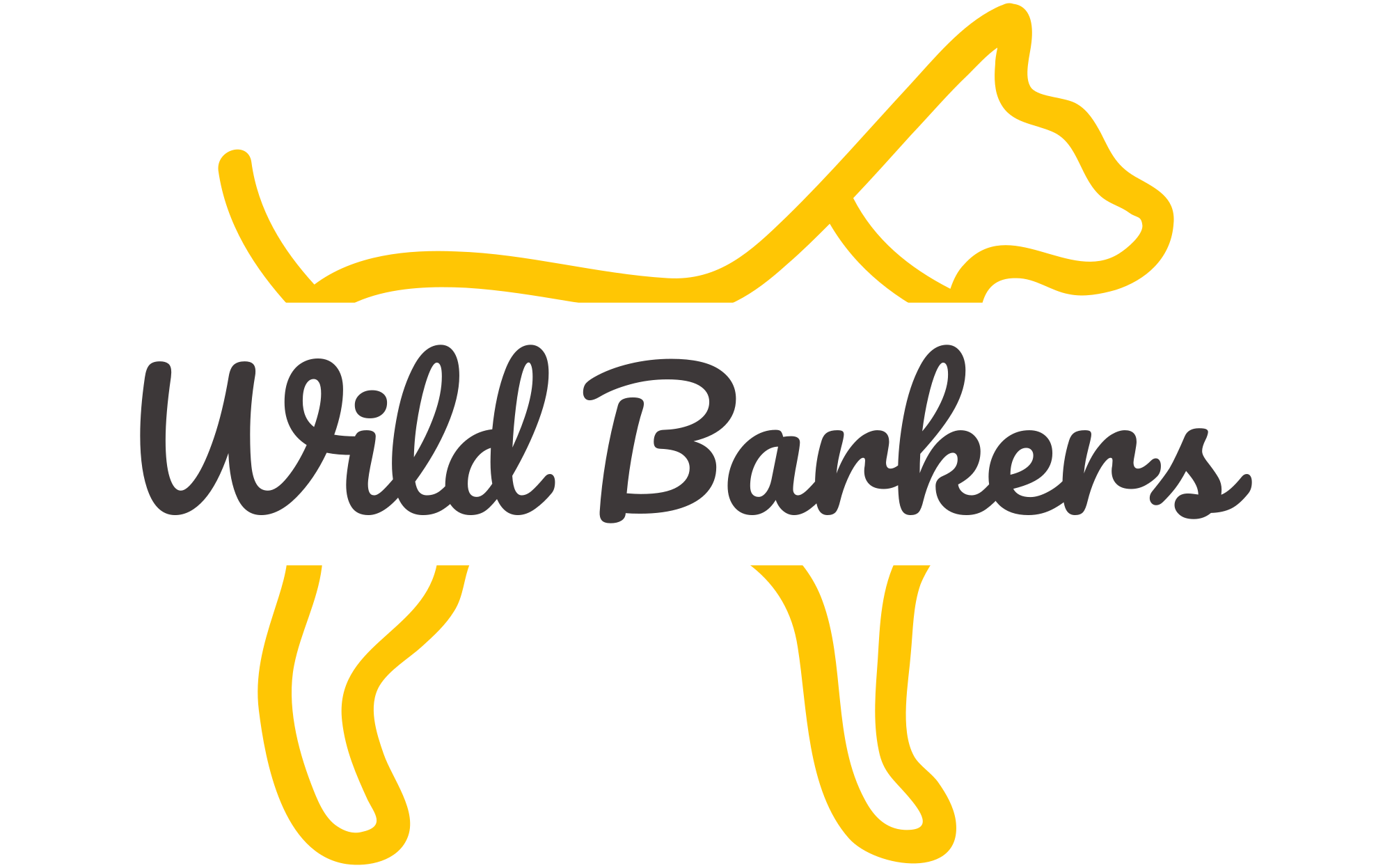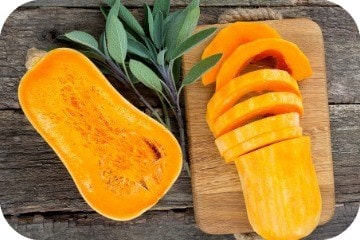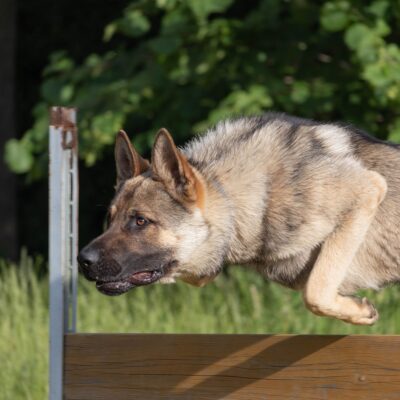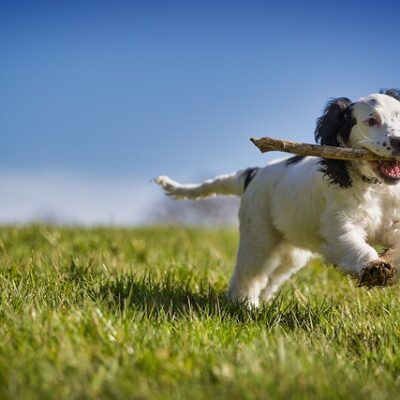Can Dogs Eat Squash? All varieties of squash are safe for dogs to eat. Butternut squash is full of healthy vitamins and nutrients; these include; Vitamin A, B6, C, Folate, and Magnesium. These enhance your dog’s health and can help cure any stomach bugs that lead to diarrhea. Squash also has antioxidants that act as an anti-inflammatory, ideal for older dogs fighting arthritis.
Busy? Get Your Hands Paws On The Answers Quickly…
- Can Dogs Eat Squash?
- What Are The Different Types Of Squash?
- How To Cook Butternut Squash For Your Dog
- Other Nutritious Fruit and Vegetables Suitable For Dogs
- FAQs
CAN DOGS EAT SQUASH?
There’s no reason to include squash in a dogs’ diet as they will get their nutrients from their regular food. However, that doesn’t mean it can’t be included in healthy treats. Just like any other food your dog has, you should give it to them in moderation. When they’re eating it for the first time, you should closely monitor their behavior in case they have a squash allergen.
Health Benefits
Vitamin A
Squash helps to provide your dog with vitamin A. Vitamin A is vital for your dog as it helps to improve and maintain their optimal health. Vitamin A also helps to keep your dogs skin, coat muscles, and nerves in working order; without this vital vitamin, dogs will become lethargic and seriously ill. Other vegetables high in vitamin A include; carrots, spinach, pumpkin, and sweet potatoes.
Vitamin B6
Vitamin B6 for dogs’ is vital. This vitamin is responsible for aiding the production of glucose, help function the blood cell and nervous systems, regulate hormones, and activate genes. Other foods high in B6 include; green vegetables, organ meats, whole grains, and some dairy products.
Vitamin C
This vitamin is of high importance. The antioxidants help reduce inflammation inside the dogs’ body as well as helping with cognitive aging. Dogs’ can produce vitamin C in their liver, but that does not mean you should factor it out of their diet as it offers other health benefits. Foods high in vitamin C include; broccoli, sprouts, lychees, and lemons.
Folate
Folate, or commonly known as folic acid, is essential for your dog. Folic acid is a necessity for amino metabolism and ensures the integrity of their cell membranes. Without the necessary amount of folic acid, your dog’s cell membranes can become weak and ultimately die. Food containing substantial amounts of folate include; asparagus, beets, sprouts, broccoli, and legumes.
Magnesium
Magnesium is another vital mineral for dogs. Magnesium helps the dog’s body to process as well as functioning the nerve system and muscle mobilization. If you notice a change in your dogs’ muscle strength or tone, this could be down to a lack of magnesium. Foods that have high levels of magnesium include; tofu, whole grains, fish, and nuts.
Health Concerns
Potential Choking Hazard
When preparing the squash for your furry friend, you should ensure the chunks are easy to digest. We recommend 2x2cm cubes. Raw squash can be tough on a dogs’ stomach, therefore steaming, boiling, or baking the squash is highly recommended. See how to cook butternut squash section in this article for more information.
Allergic Reactions
As with all new foods, your dog should be closely monitored as they may be allergic. If your dog starts showing any of the allergy symptoms, you should seek immediate advice from your local veterinarian. Allergen symptoms include; diarrhea, vomiting, swollen lips, itchy skin, and loss of appetite.
WHAT ARE THE DIFFERENT TYPES OF SQUASH?
There are a considerable amount of vegetables that are classed as squash. In this section of this article, we’re going to outline the most popular summer and winter squashes.
Summer
Summer squash is harvested young and typically eaten with the seeds and rinds. However, this is not recommended for dogs due to the possibility of choking. The name “summer” is given to these squashes due to their relatively low shelf life!
Yellow Squash
Yellow squash has various types of squash, including; crookneck and straightneck squash. They’re also some cross-breed zucchini such as zephyr squash.
Yellow squash provides a good amount of nutrients. One medium-sized squash (approximately 190g) contains:
> Calories – 30
> Fat – 0g
> Protein – 2g
> Carbs – 7g
> Fiber – 2g
As well as these nutrients, a medium-sized yellow squash also provides a considerably large amount of potassium, more than a single banana would.
Potassium helps dogs with their muscle control, the balance of fluids, and nerve function.
The mild flavor and creamy taste allows yellow squash to be cooked in a variety of ways!
Zucchini
This green summer squash has become very popular in recent years, mainly as a low-carb replacement for noodles.
Zucchini is another excellent source of nutrients for dogs. A normal-sized zucchini (approximately 190g) provides:
> Calories – 33
> Fat – 1g
> Protein – 2g
> Carbs – 6g
> Fiber – 2g
Just like the yellow squash, zucchini can be cooked in various ways. Ensure you finely chop it into small edible chunks to avoid your dog choking. For more information on zucchini for dogs, read our article “Can Dogs Eat Zucchini?”.
Pattypan Squash
Pattypan squash, commonly known as patty pan, is one of the smallest types of squash, ranging from 1.5 to 3 inches in length.
Their scallop-like shaped edge gives it the nickname “scallop squash.”
One cup of chopped patty pan provides your dog with:
> Calories – 23
> Fat – 0g
> Protein – 2g
> Carbs – 5g
> Fiber – 2g
This type of squash is excellent for dogs as it is low in calories but also high in vitamin C, manganese, and folate.
Winter
Winter squash tend to be harvested later on in their life. Their firm rinds and hard seeds allow them to have a longer shelf life, unlike the summer squash. When serving, you should remove the seeds and rinds as they’ll be difficult to digest for both dogs and humans.
The squash varieties that are classed as “winter” fruits are named due to their long shelf life. Most of them are harvested later in the summer and early fall.
Butternut Squash
Butternut squash is a popular choice for many households. It is a large variety of squash with a pale rind and orange flesh.
One cup (approximately 140g) of butternut squash provides your dog with:
> Calories – 63
> Fat – 0g
> Protein – 1g
> Carbs – 16g
> Fiber – 3g
The butternut squash is an excellent source of vitamin C and beta carotene, both of which act as antioxidants. Antioxidants act as anti-inflammatory inside the dogs’ body. It will help older dogs with swelling and inflammation around the joints (arthritis).
Spaghetti Squash
This squash gets its name from the strands inside the rind that, once cooked, resemble the look of spaghetti. Due to this, it is a popular choice of a low-carb spaghetti alternative, making it a great choice for your furry friend!
One cup (100g) of spaghetti squash provides your dog with:
> Calories – 31
> Fat – 1g
> Protein – 1g
> Carbs – 7g
> Fiber – 2g
Because this winter squash is low in carbs, it provides an excellent choice for anyone following a low-carb diet. It’s also an excellent choice for your dog as low-carb treats prevent your dog from becoming overweight or obese.
Pumpkin
Pumpkin is a very versatile squash as it can be used in desserts, soups, or just as a savory snack. Pumpkin seeds are edible when cooked.
One cup (approximately 115g) of pumpkin provides your dog with;
> Calories – 30
> Fat – 0g
> Protein – 1g
> Carbs – 8g
> Fiber – 1g
As well as these nutrients, pumpkin also has high levels of antioxidants that act as an anti-inflammatory for your dog. This fruit also provides excellent levels of potassium and vitamin C.
HOW TO COOK BUTTERNUT SQUASH FOR YOUR DOG
There are a variety of ways of cooking squash for your dogs, one thing to ensure before cooking always remove the seeds and rind. Also, cut the squash into cubes approximately 1cm² – 2cm². This will help to reduce the possibility of your dog choking.
These are the best methods of cooking squash for your dogs;
> Boil
> Steam
> Bake
Once cooked, you can use the small chunks as a treat. As well as this, you can also add it to their kibble or daily meal to increase the vitamins and minerals.
OTHER NUTRITIOUS FRUIT AND VEGETABLES SUITABLE FOR DOGS
Beets
Beets provide your dog with an excellent amount of nutrients. It is also high in vitamins and minerals, just what your dog needs to stay healthy!
Vitamin B9 / Folic AcidThis is a necessity in a dog’s diet as it helps to function the brain and intestine properly. A lack of Vitamin B9 / Folic Acid can lead to anemia in dogs. This vitamin is needed most before and during pregnancy. The required amount of folic acid for dogs is relatively low; the recommended allowance for dogs is 0.270mg/kg.
Improved Digestive System
Beets are a great source of fiber. Fiber improves a dog’s digestion and excretion of food. Foods rich in fiber ensure a dog feels full while consuming a low amount of calories, perfect for an overweight dog following a strict dietary program.
Research suggests that dogs need approximately 2.5%-4.5% fiber in their daily diet. One cup of beets provides 3.8g of fiber.
Increased Immunity
Beets provide excellent levels of vitamin C, which helps with your dogs’ immunity; it also helps with the strengthening of their bones and muscles. If your dog has a deficiency of vitamin C, this can cause scurvy. Scurvy causes things such as anemia, urinal bleeding, swollen & discolored gums.
Beets provide 6.7mg of Vitamin C per one cup. Unlike humans, dogs can possess the ability to make their own and, therefore, can live a healthy life without it.
Rich In Iron
Dogs need iron in their diet to help develop their red blood cells. A lack of iron will cause the bone marrow to produce much smaller red blood cells, thus lowering the amount of oxygen intake. A deficiency in iron is known to cause anemia. In worst-case scenarios, anemia will cause your dog to need a blood transfusion.
Beets provide 1.1mg of iron per cup. An average dog’s iron intake will be approximately 80mg/kg of dry matter.
Helps With The Nerve, Muscle and Enzyme Functioning
Beets provide your dogs with proper levels of potassium. Potassium helps with the nerve, muscle, and enzyme function. Hyperkalemia happens in dogs when their potassium levels are lower than usual. Low potassium in dogs can harm their cell structure and eventually affect the organs, which can ultimately be life-threatening if untreated.
Beets provide 442mg of potassium per one cup.
Ginger
Nausea
There can be several influencing factors that cause nausea/car sickness, feeling under the weather, treatment for an underlying issue. Whatever may be the reason, fresh or powdered ginger can help your dog with nausea.
The most common cause of nausea is a long old drive in the car. A high percentage of dogs will suffer from motion sickness at some stage in their life. A little added spice of ginger in their meal a few hours before setting off on your trip will help to reduce the chances of car sickness and nausea, give it a try!
Inflammation
A common problem in older dogs is inflammation of the joints, commonly known as arthritis. As dogs get older, the cartilage within the joints can become easily damaged, and this makes their bones, joints, and muscles sore and stiff, ultimately affecting their ability to move or jump.
It is essential more than ever that your dog is getting the nutrients they need. Adding a fresh or powdered ginger root to their daily diet will help to reduce the inflammation around the joints, thus helping to improve their mobility.
Digestion/Bloat
Bloat, also scientifically known as gastric dilation volvulus, can be a life-threatening illness in dogs and therefore needs to be treated straight away or completely avoided from the beginning. This condition is the stomach expanding caused by a buildup of food and gas that cannot be expelled.
Scientific research suggests that ginger can help reduce the build-up of foods and gases as it accelerates the emptying of the stomach.
In regards to digestion, ginger has been proved to promote saliva flow and other gastric juices, which enhance nutrient absorption and the breakdown of food.
Watermelon
Watermelon is 92% water, making it a great refreshing and hydrating treat for dogs. It is low in calories, salt, and fat as well as containing vitamins A, B6, and C, all of which are essential in a dog’s diet.
Vitamin A
A vitamin A rich diet will help keep your dog’s coat shiny, muscles strong, and good night vision. Other foods rich in vitamin A include cod liver oil, beef liver, sweet potato, and carrots.
Vitamin B6
This vitamin aids with controlling hormones specifically for thyroid-related issues. Sufficient B6 helps with heart health, weight regulation, and water regulation. Other foods with high B6 levels include eggs, fish, turkey, chicken, and wholegrain rice.
Vitamin C
Several studies have shown that dogs with a sufficient level of vitamin C are better at fighting disease and illnesses. Stress and exhaustion can cause a depletion in vitamin C. Other foods rich in vitamin C include broccoli, spinach, potatoes, and Brussels sprouts.
Calories
This fruit is low in calories and a great refreshing snack for dogs. Watermelon has around 50 calories per cup. Dogs should not consume more than 10% of their calorie intake in treats. So if your dog’s daily calorie intake should be 250 calories, they can safely have 1/2 cup of watermelon as a healthy treat.
Sugar
Watermelon does have high sugar content, and although this is natural sugar (fructose) is it still recommended to eat in moderation.
If your dog does have diabetes or any other condition which could be affected by their sugar intake, make sure to consult a vet before feeding. Alternative low sugar treats, such as vegetables could be a great alternative.
Fiber
Fiber isn’t a necessity in a dog’s diet and isn’t something ‘wild’ dogs would have eaten. However, it can help with the gut, digestive system, and to keep consistent bowel movements.
FAQS
Can Dogs Eat Mashed Potato?
Yes! Dogs can eat mashed potatoes. However, you must avoid adding any seasoning. Potatoes are rich in vitamin C & B6, Iron and magnesium. You should only give it in moderation as it is a high carb food. High carb foods can ultimately lead to your dog gaining weight and becoming obese.
Are Carrots Good For My Dog?
Carrots are an excellent snack for dogs due to them being super nutritious and easily affordable. Cooked or raw carrots are full of nutritious vitamins and minerals, including; vitamin A & B6, fiber, potassium, and biotin.
Frozen carrots are a great teething tool for young pups who have discomforting teeth pain. You can also give frozen carrots to older dogs; this will act as a chew toy and improve their dental health.
Is Peanut Butter Good For Dogs?
Yes! Peanut butter is an excellent treat and even better inside a stimulant toy, such as a kong. For more information on peanut butter for dogs, read our article “Can Dogs Eat Peanut Butter?”.
Why Do Dogs Eat Grass?
Dogs tend to eat grass when they’re lacking fiber and other nutrients. However, it can also be a sign of an unlying issue as dogs will eat grass when they have an upset stomach. For more information on this, read our article “Why Do Dogs Eat Grass?”.
Looking for more pawsome posts? Check these out…
Can Dogs Eat Lettuce?
How To Make A Snuffle Mat
When Do Puppies Lose Their Teeth?
Can Dogs Eat Broccoli?
Can Dogs Eat Watermelon?
Disclaimer: Each dog is different, and every circumstance is different. All efforts have been made to provide accurate information. However, it is not provided by a qualified Veterinarian, Veterinarian Surgeon, or Behaviorist. The information provided is purely educational. The information should not be used as an alternative or substitute for medical care. If you have any health or medical concerns, contact a qualified Veterinary Surgeon or Veterinarian immediately.










No Comment! Be the first one.